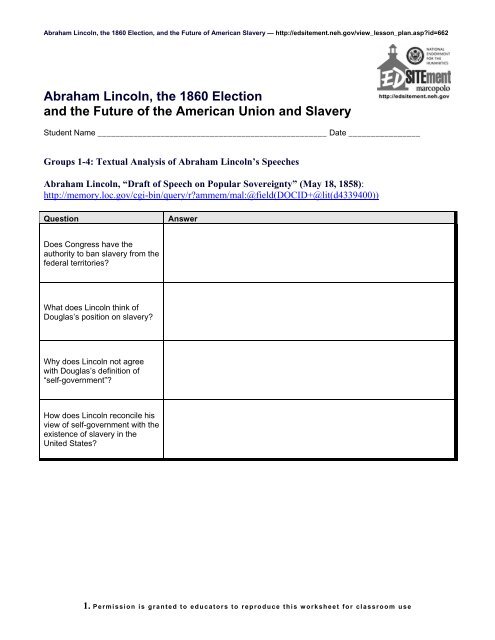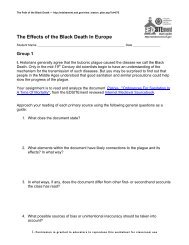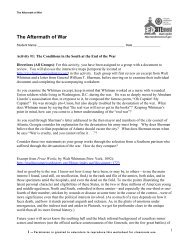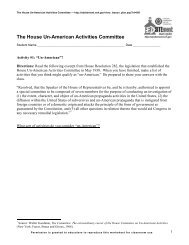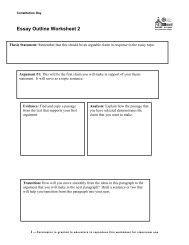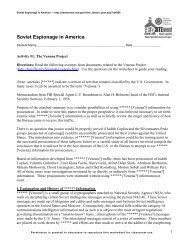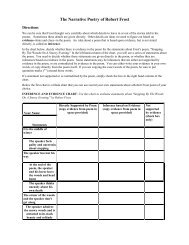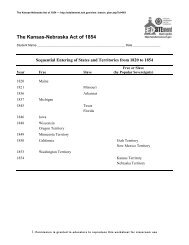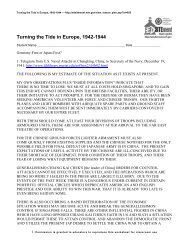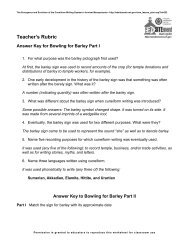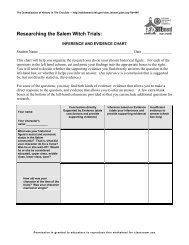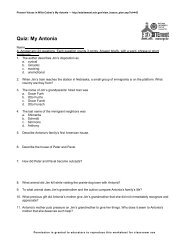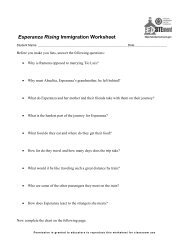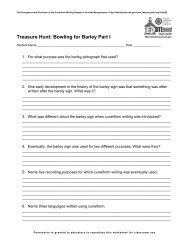Abraham Lincoln, the 1860 Election - EDSITEment
Abraham Lincoln, the 1860 Election - EDSITEment
Abraham Lincoln, the 1860 Election - EDSITEment
You also want an ePaper? Increase the reach of your titles
YUMPU automatically turns print PDFs into web optimized ePapers that Google loves.
<strong>Abraham</strong> <strong>Lincoln</strong>, <strong>the</strong> <strong>1860</strong> <strong>Election</strong>, and <strong>the</strong> Future of American Slavery — http://edsitement.neh.gov/view_lesson_plan.asp?id=662<br />
<strong>Abraham</strong> <strong>Lincoln</strong>, <strong>the</strong> <strong>1860</strong> <strong>Election</strong><br />
and <strong>the</strong> Future of <strong>the</strong> American Union and Slavery<br />
Student Name ___________________________________________________ Date ________________<br />
Groups 1-4: Textual Analysis of <strong>Abraham</strong> <strong>Lincoln</strong>’s Speeches<br />
<strong>Abraham</strong> <strong>Lincoln</strong>, “Draft of Speech on Popular Sovereignty” (May 18, 1858):<br />
http://memory.loc.gov/cgi-bin/query/r?ammem/mal:@field(DOCID+@lit(d4339400))<br />
Question<br />
Answer<br />
Does Congress have <strong>the</strong><br />
authority to ban slavery from <strong>the</strong><br />
federal territories?<br />
What does <strong>Lincoln</strong> think of<br />
Douglas’s position on slavery?<br />
Why does <strong>Lincoln</strong> not agree<br />
with Douglas’s definition of<br />
“self-government”?<br />
How does <strong>Lincoln</strong> reconcile his<br />
view of self-government with <strong>the</strong><br />
existence of slavery in <strong>the</strong><br />
United States?<br />
1. Permission is granted to educators to reproduce this worksheet for classroom use
<strong>Abraham</strong> <strong>Lincoln</strong>, <strong>the</strong> <strong>1860</strong> <strong>Election</strong>, and <strong>the</strong> Future of American Slavery — http://edsitement.neh.gov/view_lesson_plan.asp?id=662<br />
<strong>Abraham</strong> <strong>Lincoln</strong>, “Speech Delivered in Springfield” (1858):<br />
http://www.gilderlehrman.org/collection/document.php?id=34<br />
Question<br />
Answer<br />
How long has <strong>Lincoln</strong> opposed<br />
slavery?<br />
Why did he not oppose it<br />
publicly in his early political<br />
career?<br />
What event caused him to reenter<br />
<strong>the</strong> political arena to work<br />
against <strong>the</strong> extension of<br />
slavery?<br />
How does he think <strong>the</strong><br />
American Founders viewed <strong>the</strong><br />
future of slavery in <strong>the</strong> U.S.?<br />
What event made <strong>the</strong> use of<br />
slaves more profitable in <strong>the</strong><br />
U.S., thus confounding <strong>the</strong><br />
Founders’ prediction?<br />
Does <strong>Lincoln</strong> believe <strong>the</strong><br />
Declaration of Independence<br />
applies to black Americanseven<br />
slaves?<br />
What is <strong>the</strong> conspiracy that<br />
<strong>Lincoln</strong> claims Stephen Douglas<br />
is participating in?<br />
2. Permission is granted to educators to reproduce this worksheet for classroom use
<strong>Abraham</strong> <strong>Lincoln</strong>, <strong>the</strong> <strong>1860</strong> <strong>Election</strong>, and <strong>the</strong> Future of American Slavery — http://edsitement.neh.gov/view_lesson_plan.asp?id=662<br />
<strong>Abraham</strong> <strong>Lincoln</strong>, “Address at Cooper Institute,” Excerpts (February 27, <strong>1860</strong>):<br />
http://douglassarchives.org/linc_a89.htm, paragraphs 34, 68-70<br />
Question<br />
Answer<br />
Does <strong>the</strong> Republican Party<br />
believe in <strong>the</strong> American<br />
Founders’ approach to slavery?<br />
What is <strong>the</strong> Founders’ view of<br />
slavery in America?<br />
What does <strong>Lincoln</strong> think <strong>the</strong><br />
nation should do if it believes<br />
that slavery is right?<br />
What should it do if slavery is<br />
wrong? Is <strong>the</strong>re a difference<br />
between dealing with slavery<br />
where it already exists and<br />
where it does not yet exist?<br />
Why does Stephen Douglas’s<br />
“don’t care” policy regarding<br />
slavery make no sense?<br />
What does <strong>Lincoln</strong> mean by<br />
“Let us have faith that right<br />
makes might”? How does this<br />
differ from “might makes right”?<br />
3. Permission is granted to educators to reproduce this worksheet for classroom use
<strong>Abraham</strong> <strong>Lincoln</strong>, <strong>the</strong> <strong>1860</strong> <strong>Election</strong>, and <strong>the</strong> Future of American Slavery — http://edsitement.neh.gov/view_lesson_plan.asp?id=662<br />
<strong>Abraham</strong> <strong>Lincoln</strong>, <strong>the</strong> <strong>1860</strong> <strong>Election</strong><br />
and <strong>the</strong> Future of <strong>the</strong> American Union and Slavery<br />
Student Name ___________________________________________________ Date ________________<br />
Group 1: Textual Analysis of William Lloyd Garrison’s Editorials<br />
William Lloyd Garrison, “To <strong>the</strong> Public” (January 1, 1831):<br />
http://www.pbs.org/wgbh/aia/part4/4h2928t.html<br />
Question<br />
Answer<br />
Why does Garrison no longer<br />
endorse a “gradual abolition” of<br />
slavery?<br />
How does Garrison defend <strong>the</strong><br />
“severity” of his rhetoric in<br />
denouncing slavery?<br />
Why does he not agree with<br />
those who argue that his<br />
condemnation of slavery<br />
actually slows <strong>the</strong> progress<br />
toward emancipation?<br />
4. Permission is granted to educators to reproduce this worksheet for classroom use
<strong>Abraham</strong> <strong>Lincoln</strong>, <strong>the</strong> <strong>1860</strong> <strong>Election</strong>, and <strong>the</strong> Future of American Slavery — http://edsitement.neh.gov/view_lesson_plan.asp?id=662<br />
William Lloyd Garrison, “The American Union” (January 10, 1845):<br />
“Tyrants of <strong>the</strong> old world! contemners of <strong>the</strong> rights of man! disbelievers in human freedom and equality!<br />
enemies of mankind! console not yourselves with <strong>the</strong> delusion, that REPUBLICANISM and <strong>the</strong><br />
AMERICAN UNION are synonymous terms—or that <strong>the</strong> downfall of <strong>the</strong> latter will be <strong>the</strong> extinction of<br />
<strong>the</strong> former, and, consequently, a proof of <strong>the</strong> incapacity of <strong>the</strong> people for self-government, and a<br />
confirmation of your own despotic claims! Your thrones must crumble to dust; your sceptre of dominion<br />
drop from your powerless hands; your rod of oppression be broken; yourselves so vilely abased, that<br />
<strong>the</strong>re shall be “none so poor to do you reverence.” The will of God, <strong>the</strong> beneficent Creator of <strong>the</strong> human<br />
family, cannot always be frustrated. It is his will that every form of usurpation, every kind of injustice,<br />
every device of tyranny, shall come to nought; that peace, and liberty, and righteousness, shall “reign<br />
from sea to sea, and from <strong>the</strong> rivers to <strong>the</strong> ends of <strong>the</strong> earth”; and that, throughout <strong>the</strong> earth, in <strong>the</strong><br />
fulness of a sure redemption, <strong>the</strong>re shall be “none to molest or make afraid.” Humanity, covered with<br />
gore, cries with a voice that pierces <strong>the</strong> heavens. “His will be done!” Justice, discrowned by <strong>the</strong> hand of<br />
violence, exclaims in tones of deep solemnity, “HIS WILL BE DONE!” Liberty, burdened with chains,<br />
and driven into exile, in thunder-tones responds, “HIS WILL BE DONE!”<br />
Tyrants! know that <strong>the</strong> rights of man are inherent and unalienable, and <strong>the</strong>refore, not to be forfeited by<br />
<strong>the</strong> failure of any form of government, however democratic. Let <strong>the</strong> American Union perish; let <strong>the</strong>se<br />
allied States be torn with faction, or drenched in blood; let this republic realize <strong>the</strong> fate of Rome and<br />
Carthage, of Babylon and Tyre; still those rights would remain undiminished in strength, unsullied in<br />
purity, unaffected in value, and sacred as <strong>the</strong>ir Divine Author. If nations perish, it is not because of <strong>the</strong>ir<br />
devotion to liberty, but for <strong>the</strong>ir disregard of its requirements. Man is superior to all political compacts,<br />
all governmental arrangements, all religious institutions. As means to an end, <strong>the</strong>se may sometimes be<br />
useful, though never indispensable; but that end must always be <strong>the</strong> freedom and happiness of man,<br />
INDIVIDUAL MAN. It can never be true that <strong>the</strong> public good requires <strong>the</strong> violent sacrifice of any, even<br />
<strong>the</strong> humblest citizen; for it is absolutely dependent on his preservation, not destruction. To do evil that<br />
good may come, is equally absurd and criminal. The time for <strong>the</strong> overthrow of any government, <strong>the</strong><br />
abandonment of any alliance, <strong>the</strong> subversion of any institution, is, whenever it justifies <strong>the</strong> immolation<br />
of <strong>the</strong> individual to secure <strong>the</strong> general welfare; for <strong>the</strong> welfare of <strong>the</strong> many cannot be hostile to <strong>the</strong> safety<br />
of <strong>the</strong> few. In all agreements, in all measures, in all political or religious enterprises, in all attempts to<br />
redeem <strong>the</strong> human race, man, as an individual, is to be held paramount …<br />
Tyrants! confident of its overthrow, proclaim not to your vassals that <strong>the</strong> AMERICAN UNION is an<br />
experiment of Freedom, which, if it fail, will forever demonstrate <strong>the</strong> necessity of whips for <strong>the</strong> backs,<br />
and chains for <strong>the</strong> limbs of <strong>the</strong> people. Know that its subversion is essential to <strong>the</strong> triumph of justice, <strong>the</strong><br />
deliverance of <strong>the</strong> oppressed, <strong>the</strong> vindication of <strong>the</strong> BROTHERHOOD OF THE RACE. It was<br />
conceived in sin, and brought forth in iniquity; and its career has been marked by unparalleled<br />
hypocrisy, by high-handed tyranny, by a bold defiance of <strong>the</strong> omniscience and omnipotence of God.<br />
Freedom indignantly disowns it, and calls for its extinction; for within its borders are three millions of<br />
Slaves, whose blood constitutes its cement, whose flesh forms a large and flourishing branch of its<br />
commerce, and who are ranked with four-footed beasts and creeping things. To secure <strong>the</strong> adoption of<br />
<strong>the</strong> Constitution of <strong>the</strong> United States, it was agreed, first, that <strong>the</strong> African slave-trade, —till that time, a<br />
feeble, isolated colonial traffic,—should for at least twenty years be prosecuted as a national interest<br />
under <strong>the</strong> American flag, and protected by <strong>the</strong> national arm; —secondly, that a slaveholding oligarchy,<br />
created by allowing three-fifths of <strong>the</strong> slave population to be rep resented by <strong>the</strong>ir taskmasters, should be<br />
allowed a permanent seat in Congress;—thirdly, that <strong>the</strong> slave system should be secured against internal<br />
revolt and external invasion, by <strong>the</strong> united physical force of <strong>the</strong> country; —fourthly, that not a foot of<br />
national territory should be granted, on which <strong>the</strong> panting fugitive from Slavery might stand, and be safe<br />
from his pursuers—thus making every citizen a slave-hunter and slave-catcher. To say that this<br />
5. Permission is granted to educators to reproduce this worksheet for classroom use
<strong>Abraham</strong> <strong>Lincoln</strong>, <strong>the</strong> <strong>1860</strong> <strong>Election</strong>, and <strong>the</strong> Future of American Slavery — http://edsitement.neh.gov/view_lesson_plan.asp?id=662<br />
“covenant with death” shall not be annulled—that this “agreement with hell” shall continue to stand—<br />
that this “refuge of lies” shall not be swept away—is to hurl defiance at <strong>the</strong> eternal throne, and to give<br />
<strong>the</strong> lie to Him who sits <strong>the</strong>reon. It is an attempt, alike monstrous and impracticable, to blend <strong>the</strong> light of<br />
heaven with <strong>the</strong> darkness of <strong>the</strong> bottomless pit, to unite <strong>the</strong> living with <strong>the</strong> dead, to associate <strong>the</strong> Son of<br />
God with <strong>the</strong> prince of evil.<br />
Accursed be <strong>the</strong> AMERICAN UNION, as a stupendous republican imposture!<br />
Accursed be it, as <strong>the</strong> most frightful despotism, with regard to three millions of <strong>the</strong> people, ever<br />
exercised over any portion of <strong>the</strong> human family!<br />
Accursed be it, as <strong>the</strong> most subtle and atrocious compromise ever made to gratify power and selfishness!<br />
Accursed be it, as a libel on Democracy, and a bold assault on Christianity! …<br />
Henceforth, <strong>the</strong> watchword of every uncompromising abolitionist, of every friend of God and liberty,<br />
must be, both in a religious and political sense—“NO UNION WITH SLAVEHOLDERS!””<br />
Question<br />
Answer<br />
Why does Garrison not like <strong>the</strong><br />
United States, especially its<br />
federal government?<br />
What is more important to<br />
Garrison than even political or<br />
religious institutions?<br />
Why does he argue that <strong>the</strong><br />
U.S. Constitution is not worthy<br />
of respect?<br />
List a few examples of <strong>the</strong><br />
harsh language Garrison uses<br />
to denounce <strong>the</strong> union of free<br />
and slaveholding states of<br />
America.<br />
What slogan does he proclaim<br />
as <strong>the</strong> motto of any serious<br />
abolitionist?<br />
6. Permission is granted to educators to reproduce this worksheet for classroom use
<strong>Abraham</strong> <strong>Lincoln</strong>, <strong>the</strong> <strong>1860</strong> <strong>Election</strong>, and <strong>the</strong> Future of American Slavery — http://edsitement.neh.gov/view_lesson_plan.asp?id=662<br />
Comparison and Contrast: <strong>Abraham</strong> <strong>Lincoln</strong> and William Lloyd Garrison<br />
What did each<br />
believe about <strong>the</strong><br />
following<br />
subjects?<br />
<strong>Abraham</strong> <strong>Lincoln</strong><br />
William Lloyd Garrison<br />
Do <strong>the</strong>y<br />
agree<br />
(yes/no)?<br />
The American<br />
Union<br />
The U.S.<br />
Constitution<br />
The Future of<br />
Slavery<br />
7. Permission is granted to educators to reproduce this worksheet for classroom use
<strong>Abraham</strong> <strong>Lincoln</strong>, <strong>the</strong> <strong>1860</strong> <strong>Election</strong>, and <strong>the</strong> Future of American Slavery — http://edsitement.neh.gov/view_lesson_plan.asp?id=662<br />
<strong>Abraham</strong> <strong>Lincoln</strong>, <strong>the</strong> <strong>1860</strong> <strong>Election</strong><br />
and <strong>the</strong> Future of <strong>the</strong> American Union and Slavery<br />
Student Name ___________________________________________________ Date ________________<br />
Group 2: Textual Analysis of Frederick Douglass’s Speeches<br />
Frederick Douglass, “The Meaning of July Fourth for <strong>the</strong> Negro” (July 5, 1852):<br />
http://www.pbs.org/wgbh/aia/part4/4h2927t.html<br />
Question<br />
Answer<br />
What is Douglass’s opinion of<br />
<strong>the</strong> American Founders?<br />
Given <strong>the</strong> occasion for his<br />
speech, why does he call for<br />
mourning and not rejoicing?<br />
How does he show that<br />
everyone in America, North and<br />
South, knows that <strong>the</strong> enslaved<br />
African is a human being?<br />
What gives Douglass hope for<br />
<strong>the</strong> future of blacks in America?<br />
8. Permission is granted to educators to reproduce this worksheet for classroom use
<strong>Abraham</strong> <strong>Lincoln</strong>, <strong>the</strong> <strong>1860</strong> <strong>Election</strong>, and <strong>the</strong> Future of American Slavery — http://edsitement.neh.gov/view_lesson_plan.asp?id=662<br />
Frederick Douglass, “The Constitution of <strong>the</strong> United States: Is it Pro-Slavery or Anti-Slavery?”<br />
(March 26, <strong>1860</strong>):<br />
The way to abolish slavery in America is to vote such men into power, as will use <strong>the</strong>ir powers for <strong>the</strong><br />
abolition of slavery. . . .<br />
My argument against <strong>the</strong> dissolution of <strong>the</strong> American Union is this: It would place <strong>the</strong> slave system<br />
more exclusively under <strong>the</strong> control of <strong>the</strong> slave-holding States, and withdraw it from <strong>the</strong> power in <strong>the</strong><br />
Nor<strong>the</strong>rn States which is opposed to slavery. Slavery is essentially barbarous in its character. It, above<br />
all things else, dreads <strong>the</strong> presence of an advanced civilization. It flourishes best where it meets no<br />
reproving frowns, and hears no condemning voices. While in <strong>the</strong> Union it will meet with both. Its hope<br />
of life in <strong>the</strong> last resort is to get out of <strong>the</strong> Union. I am, <strong>the</strong>refore, for drawing <strong>the</strong> bond of <strong>the</strong> Union<br />
more closely, and bringing <strong>the</strong> slave States more completely under <strong>the</strong> power of <strong>the</strong> free States. What<br />
<strong>the</strong>y most dread, that I most desire. I have much confidence in <strong>the</strong> instincts of <strong>the</strong> slave-holders. They<br />
see that <strong>the</strong> Constitution will afford slavery no protection, when it shall cease to be administered by<br />
slave-holders. They see, moreover, that if <strong>the</strong>re is once a will in <strong>the</strong> people of America to abolish<br />
slavery, <strong>the</strong>re is no word, no syllable in <strong>the</strong> Constitution to forbid that result. They see that <strong>the</strong><br />
Constitution has not saved slavery in Rhode Island, in Connecticut, in New York, or Pennsylvania; that<br />
<strong>the</strong> free States have increased from one up to eighteen in number, while <strong>the</strong> slave States have only added<br />
three to <strong>the</strong>ir original number. There were twelve slave States at <strong>the</strong> beginning of <strong>the</strong> Government: <strong>the</strong>re<br />
are fifteen now. There was one free State at <strong>the</strong> beginning of <strong>the</strong> Government: <strong>the</strong>re are eighteen now.<br />
The dissolution of <strong>the</strong> Union would not give <strong>the</strong> North a single advantage over slavery, but would take<br />
from it many. Within <strong>the</strong> Union we have a firm basis of opposition to slavery. It is opposed to all <strong>the</strong><br />
great objects of <strong>the</strong> Constitution. The dissolution of <strong>the</strong> Union is not only an unwise but a cowardly<br />
measure—fifteen millions running away from three hundred and fifty thousand slave-holders. Mr.<br />
Garrison and his friends tell us that while in <strong>the</strong> Union we are responsible for slavery. He and <strong>the</strong>y sing<br />
out “No union with slave-holders,” and refuse to vote. I admit our responsibility for slavery while in <strong>the</strong><br />
Union; but I deny that going out of <strong>the</strong> Union would free us from that responsibility. There now clearly<br />
is no freedom from responsibility for slavery to any American citizen short of <strong>the</strong> abolition of slavery.<br />
The American people have gone quite too far in this slave-holding business now, to sum up <strong>the</strong>ir whole<br />
business with slavery by singing out <strong>the</strong> cant phrase, “No union with slave-holders!” To desert <strong>the</strong><br />
family-hearth may place <strong>the</strong> recreant husband out of <strong>the</strong> presence of his starving children, but this does<br />
not free him from responsibility. If a man were on board of a pirate ship, and, in company with o<strong>the</strong>rs,<br />
had robbed and plundered, his whole duty would not be performed simply by taking <strong>the</strong> long-boat and<br />
singing out, “No union with pirates.” His duty would be to restore <strong>the</strong> stolen property. The American<br />
people in <strong>the</strong> Nor<strong>the</strong>rn States have helped to enslave <strong>the</strong> black people. Their duty will not have been<br />
done until <strong>the</strong>y give <strong>the</strong>m back <strong>the</strong>ir plundered rights. Reference was made at <strong>the</strong> City Hall to my having<br />
once held o<strong>the</strong>r opinions, and very different opinions to those I have now expressed. An old speech of<br />
mine, delivered fourteen years ago, was read to show, I know not what, that I am not infallible. If so, I<br />
have to say in defense that I never pretended to be. Although I cannot accuse myself of being<br />
remarkably unstable, I do not pretend that I have never altered my opinion both in respect to men and<br />
things. Indeed, I have been very much modified both in feeling and opinion within <strong>the</strong> last fourteen<br />
years. When I escaped from slavery, and was introduced to <strong>the</strong> Garrisonians, I adopted very many of<br />
<strong>the</strong>ir opinions, and defended <strong>the</strong>m just as long as I deemed <strong>the</strong>m true. I was young, had read but little,<br />
and naturally took some things on trust. Subsequent experience and reading have led me to examine for<br />
myself. This has brought me to o<strong>the</strong>r conclusions. When I was a child, I thought and spoke like a child.<br />
But <strong>the</strong> question is not as to what were my opinions fourteen years ago, but what <strong>the</strong>y are now. If I am<br />
right now, it really does not matter what I was fourteen years ago. My position now is one of reform, not<br />
of revolution; I would act for <strong>the</strong> abolition of slavery through <strong>the</strong> Government—not over its ruins. If<br />
slave-holders have ruled <strong>the</strong> American Government for <strong>the</strong> last fifty years, let <strong>the</strong> anti-slavery men rule<br />
9. Permission is granted to educators to reproduce this worksheet for classroom use
<strong>Abraham</strong> <strong>Lincoln</strong>, <strong>the</strong> <strong>1860</strong> <strong>Election</strong>, and <strong>the</strong> Future of American Slavery — http://edsitement.neh.gov/view_lesson_plan.asp?id=662<br />
for <strong>the</strong> next fifty years. If <strong>the</strong> South has made <strong>the</strong> Constitution bend to <strong>the</strong> purposes of slavery, let <strong>the</strong><br />
North now make that instrument bend to <strong>the</strong> cause of freedom and justice. If three hundred and fifty<br />
thousand slave-holders have, by devoting <strong>the</strong>ir energies to that single end, been able to make slavery <strong>the</strong><br />
vital and animating spirit of <strong>the</strong> American Confederacy for <strong>the</strong> last seventy-two years, now let <strong>the</strong><br />
freemen of <strong>the</strong> North, who have <strong>the</strong> power in <strong>the</strong>ir own hands, and who can make <strong>the</strong> American<br />
Government just what <strong>the</strong>y think fit, resolve to blot out forever <strong>the</strong> foul and haggard crime, which is <strong>the</strong><br />
blight and mildew, <strong>the</strong> curse and <strong>the</strong> disgrace of <strong>the</strong> whole United States.<br />
Question<br />
Answer<br />
Does Douglass think preserving<br />
or dissolving <strong>the</strong> Union is <strong>the</strong><br />
best means of abolishing<br />
slavery?<br />
Does Douglass think <strong>the</strong><br />
Constitution needs to be<br />
amended to abolish slavery?<br />
Why does Douglass think<br />
leaving <strong>the</strong> Union would be<br />
irresponsible on <strong>the</strong> part of<br />
nor<strong>the</strong>rn states?<br />
10. Permission is granted to educators to reproduce this worksheet for classroom use
<strong>Abraham</strong> <strong>Lincoln</strong>, <strong>the</strong> <strong>1860</strong> <strong>Election</strong>, and <strong>the</strong> Future of American Slavery — http://edsitement.neh.gov/view_lesson_plan.asp?id=662<br />
Comparison and Contrast: <strong>Abraham</strong> <strong>Lincoln</strong> and Frederick Douglass<br />
What did each<br />
believe about <strong>the</strong><br />
following<br />
subjects?<br />
<strong>Abraham</strong> <strong>Lincoln</strong><br />
Frederick Douglass<br />
Do <strong>the</strong>y<br />
agree<br />
(yes/no)?<br />
The American<br />
Union<br />
The U.S.<br />
Constitution<br />
The Future of<br />
Slavery<br />
11. Permission is granted to educators to reproduce this worksheet for classroom use
<strong>Abraham</strong> <strong>Lincoln</strong>, <strong>the</strong> <strong>1860</strong> <strong>Election</strong>, and <strong>the</strong> Future of American Slavery — http://edsitement.neh.gov/view_lesson_plan.asp?id=662<br />
<strong>Abraham</strong> <strong>Lincoln</strong>, <strong>the</strong> <strong>1860</strong> <strong>Election</strong><br />
and <strong>the</strong> Future of <strong>the</strong> American Union and Slavery<br />
Student Name ___________________________________________________ Date ________________<br />
Group 3: Textual Analysis of Stephen Douglas’s Speech and Letter<br />
Stephen Douglas, “<strong>Lincoln</strong>-Douglas Debates (1858): Second Debate at Freeport, Illinois,” Excerpt<br />
(August 27, 1858): http://www.nps.gov/liho/debate2.htm<br />
The next question propounded to me by Mr. <strong>Lincoln</strong> is, can <strong>the</strong> people of a Territory in any lawful way,<br />
against <strong>the</strong> wishes of any citizen of <strong>the</strong> United States, exclude slavery from <strong>the</strong>ir limits prior to <strong>the</strong><br />
formation of a State Constitution? I answer emphatically, as Mr. <strong>Lincoln</strong> has heard me answer a hundred<br />
times from every stump in Illinois, that in my opinion <strong>the</strong> people of a Territory can, by lawful means,<br />
exclude slavery from <strong>the</strong>ir limits prior to <strong>the</strong> formation of a State Constitution. Mr. <strong>Lincoln</strong> knew that I<br />
had answered that question over and over again. He heard me argue <strong>the</strong> Nebraska bill on that principle<br />
all over <strong>the</strong> State in 1854, in 1855, and in 1856, and he has no excuse for pretending to be in doubt as to<br />
my position on that question. It matters not what way <strong>the</strong> Supreme Court may hereafter decide as to <strong>the</strong><br />
abstract question whe<strong>the</strong>r slavery may or may not go into a Territory under <strong>the</strong> Constitution, <strong>the</strong> people<br />
have <strong>the</strong> lawful means to introduce it or exclude it as <strong>the</strong>y please, for <strong>the</strong> reason that slavery cannot exist<br />
a day or an hour anywhere, unless it is supported by local police regulations.... Those police regulations<br />
can only be established by <strong>the</strong> local legislature, and if <strong>the</strong> people are opposed to slavery <strong>the</strong>y will elect<br />
representatives to that body who will by unfriendly legislation effectually prevent <strong>the</strong> introduction of it<br />
into <strong>the</strong>ir midst. If, on <strong>the</strong> contrary, <strong>the</strong>y are for it, <strong>the</strong>ir legislation will favor its extension. Hence, no<br />
matter what <strong>the</strong> decision of <strong>the</strong> Supreme Court may be on that abstract question, still <strong>the</strong> right of <strong>the</strong><br />
people to make a slave Territory or a free Territory is perfect and complete under <strong>the</strong> Nebraska bill. I<br />
hope Mr. <strong>Lincoln</strong> deems my answer satisfactory on that point.<br />
Question<br />
Answer<br />
Does Douglas believe <strong>the</strong><br />
people of a federal territory can<br />
exclude slavery prior to<br />
becoming a state of <strong>the</strong> union?<br />
Why does he think that a<br />
Supreme Court decision<br />
regarding slavery in <strong>the</strong><br />
territories does not matter when<br />
it comes to <strong>the</strong> local wishes of<br />
<strong>the</strong> territorial population?<br />
12. Permission is granted to educators to reproduce this worksheet for classroom use
<strong>Abraham</strong> <strong>Lincoln</strong>, <strong>the</strong> <strong>1860</strong> <strong>Election</strong>, and <strong>the</strong> Future of American Slavery — http://edsitement.neh.gov/view_lesson_plan.asp?id=662<br />
What does he mean by<br />
“unfriendly legislation”?<br />
Stephen A. Douglas, “Letter to J.B. Dorr” (June 22, 1859):<br />
If, as I have full faith <strong>the</strong>y will, <strong>the</strong> Democratic party shall determine in <strong>the</strong> Presidential election of <strong>1860</strong><br />
to adhere to <strong>the</strong> principles embodied in <strong>the</strong> Compromise measures of 1850, and ratified by <strong>the</strong> people in<br />
<strong>the</strong> Presidential election of 1852, and re-affirmed in <strong>the</strong> Kansas-Nebraska act of 1854, and incorporated<br />
into <strong>the</strong> Cincinnati [Democratic Party] platform in 1856, as expounded by Mr. [James] Buchanan in his<br />
letter accepting <strong>the</strong> nomination, and approved by <strong>the</strong> people in his election—in that event my friends<br />
will be at liberty to present my name to <strong>the</strong> convention, if <strong>the</strong>y see proper to do so.<br />
If, on <strong>the</strong> contrary, it shall become <strong>the</strong> policy of <strong>the</strong> Democratic party, which I cannot anticipate, to<br />
repudiate <strong>the</strong>se <strong>the</strong>ir time-honored principles, on which we have achieved so many patriotic triumphs;<br />
and, in lieu of <strong>the</strong>m, <strong>the</strong> Convention shall interpolate [or insert] into <strong>the</strong> creed of <strong>the</strong> party such new<br />
issues as <strong>the</strong> revival of <strong>the</strong> African slave trade, or a Congressional slave code for <strong>the</strong> Territories, or <strong>the</strong><br />
doctrine that <strong>the</strong> Constitution of <strong>the</strong> United States ei<strong>the</strong>r establishes or prohibits slavery in <strong>the</strong> Territories<br />
beyond <strong>the</strong> power of <strong>the</strong> people legally to control it as o<strong>the</strong>r property—it is due to candor to say that, in<br />
such an event, I could not accept <strong>the</strong> nomination if tendered to me.<br />
Question: Would Douglas’s letter encourage or discourage <strong>the</strong> following groups to support him as <strong>the</strong>ir<br />
nominee for president in <strong>1860</strong>? For each group, write one sentence that explains your answer.<br />
Sou<strong>the</strong>rn Democrats<br />
Nor<strong>the</strong>rn Democrats<br />
Abolitionists<br />
Republicans<br />
13. Permission is granted to educators to reproduce this worksheet for classroom use
<strong>Abraham</strong> <strong>Lincoln</strong>, <strong>the</strong> <strong>1860</strong> <strong>Election</strong>, and <strong>the</strong> Future of American Slavery — http://edsitement.neh.gov/view_lesson_plan.asp?id=662<br />
Comparison and Contrast: <strong>Abraham</strong> <strong>Lincoln</strong> and Stephen Douglas<br />
What did each<br />
believe about <strong>the</strong><br />
following<br />
subjects?<br />
<strong>Abraham</strong> <strong>Lincoln</strong><br />
Stephen Douglas<br />
Do <strong>the</strong>y<br />
agree<br />
(yes/no)?<br />
The American<br />
Union<br />
The U.S.<br />
Constitution<br />
The Future of<br />
Slavery<br />
14. Permission is granted to educators to reproduce this worksheet for classroom use
<strong>Abraham</strong> <strong>Lincoln</strong>, <strong>the</strong> <strong>1860</strong> <strong>Election</strong>, and <strong>the</strong> Future of American Slavery — http://edsitement.neh.gov/view_lesson_plan.asp?id=662<br />
<strong>Abraham</strong> <strong>Lincoln</strong>, <strong>the</strong> <strong>1860</strong> <strong>Election</strong><br />
and <strong>the</strong> Future of <strong>the</strong> American Union and Slavery<br />
Student Name ___________________________________________________ Date ________________<br />
Group 4: Textual Analysis Speeches by Jefferson Davis and William Lowndes Yancey<br />
Jefferson Davis, “Resolutions on <strong>the</strong> Relations of States,” Excerpt (February 2, <strong>1860</strong>):<br />
http://memory.loc.gov/ammem/amlaw/lwcglink.html<br />
Mr. DAVIS submitted <strong>the</strong> following resolutions:<br />
1. Resolved, That in <strong>the</strong> adoption of <strong>the</strong> Federal Constitution, <strong>the</strong> States adopting <strong>the</strong> same acted<br />
severally as free and independent sovereignties, delegating a portion of <strong>the</strong>ir powers to be exercised by<br />
<strong>the</strong> Federal Government for <strong>the</strong> increased security of each, against dangers domestic as well as foreign;<br />
and that any intermeddling by any one or more States, or by a combination of <strong>the</strong>ir citizens, with <strong>the</strong><br />
domestic institutions of <strong>the</strong> o<strong>the</strong>rs, on any pretext, whe<strong>the</strong>r political, moral, or religious, with <strong>the</strong> view to<br />
<strong>the</strong>ir disturbance or subversion, is in violation of <strong>the</strong> Constitution, insulting to <strong>the</strong> States so interfered<br />
with, endangers <strong>the</strong>ir domestic peace and tranquillity—objects for which <strong>the</strong> Constitution was formed—<br />
and, by necessary consequence, serves to weaken and destroy <strong>the</strong> Union itself.<br />
2. Resolved, That negro slavery, as it exists in fifteen States of this Union, composes an important<br />
portion of <strong>the</strong>ir domestic institutions, inherited from <strong>the</strong>ir ancestors, and existing at <strong>the</strong> adoption of <strong>the</strong><br />
Constitution, by which it is recognized as constituting an important element of <strong>the</strong> apportionment of<br />
powers among <strong>the</strong> States; and that no change of opinion or feeling on <strong>the</strong> part of <strong>the</strong> non-slaveholding<br />
States of <strong>the</strong> Union in relation to this institution can justify <strong>the</strong>m or <strong>the</strong>ir citizens in open and systematic<br />
attacks <strong>the</strong>reon, with a view to its overthrow; and that all such attacks are in manifest violation of <strong>the</strong><br />
mutual and solemn pledges to protect and defend each o<strong>the</strong>r, given by <strong>the</strong> States, respectively, on<br />
entering into <strong>the</strong> constitutional compact which formed <strong>the</strong> Union, and are a manifest breach of faith and<br />
a violation of <strong>the</strong> most solemn obligations.<br />
3. Resolved, That <strong>the</strong> union of <strong>the</strong>se States rests on <strong>the</strong> equality of rights and privileges among its<br />
members, and that it is especially <strong>the</strong> duty of <strong>the</strong> Senate, which represents <strong>the</strong> States in <strong>the</strong>ir sovereign<br />
capacity, to resist all attempts to discriminate ei<strong>the</strong>r in relation to person or property, so as, in <strong>the</strong><br />
Territories—which are <strong>the</strong> common possession of <strong>the</strong> United States—to give advantages to <strong>the</strong> citizens<br />
of one State which are not equally secured to those of every o<strong>the</strong>r State.<br />
4. Resolved, That nei<strong>the</strong>r Congress, nor a Territorial Legislature, whe<strong>the</strong>r by direct legislation or<br />
legislation of an indirect and unfriendly nature, possess <strong>the</strong> power to annul or impair <strong>the</strong> constitutional<br />
right of any citizen of <strong>the</strong> United States to take his slaver property into <strong>the</strong> common Territories; but it is<br />
<strong>the</strong> duty of <strong>the</strong> Federal Government <strong>the</strong>re to afford for that, as for o<strong>the</strong>r species of property, <strong>the</strong> needful<br />
protection; and if experience should at any time prove that <strong>the</strong> judiciary does not possess power to insure<br />
adequate protection, it will <strong>the</strong>n become <strong>the</strong> duty of Congress to supply such deficiency.<br />
5. Resolved, That <strong>the</strong> inhabitants of an organized Territory of <strong>the</strong> United States, when <strong>the</strong>y rightfully<br />
form a constitution to be admitted as a State into <strong>the</strong> Union, may <strong>the</strong>n, for <strong>the</strong> first time, like <strong>the</strong> people<br />
of a State when forming a new constitution, decide for <strong>the</strong>mselves whe<strong>the</strong>r slavery, as a domestic<br />
institution, shall be maintained or prohibited within <strong>the</strong>ir jurisdiction; and if Congress shall admit <strong>the</strong>m<br />
15. Permission is granted to educators to reproduce this worksheet for classroom use
<strong>Abraham</strong> <strong>Lincoln</strong>, <strong>the</strong> <strong>1860</strong> <strong>Election</strong>, and <strong>the</strong> Future of American Slavery — http://edsitement.neh.gov/view_lesson_plan.asp?id=662<br />
as a State, “<strong>the</strong>y shall be received into <strong>the</strong> Union with or without slavery, as <strong>the</strong>ir constitution may<br />
prescribe at <strong>the</strong> time of <strong>the</strong>ir admission.”<br />
6. Resolved, That <strong>the</strong> provision of <strong>the</strong> Constitution for <strong>the</strong> rendition of fugitives from service or<br />
labor, “without <strong>the</strong> adoption of which <strong>the</strong> Union could not have been formed,” and <strong>the</strong> laws of 1793 and<br />
1850, which were enacted to secure its execution, and <strong>the</strong> main features of which, being similar, bear <strong>the</strong><br />
impress of nearly seventy years of sanction by <strong>the</strong> highest judicial authority, have unquestionable claim<br />
to <strong>the</strong> respect and observance of all who enjoy <strong>the</strong> benefits of our compact of Union; and that <strong>the</strong> acts of<br />
State Legislatures to defeat <strong>the</strong> purpose, or nullify <strong>the</strong> requirements of that provision, and <strong>the</strong> laws made<br />
in pursuance of it, are hostile in character, subversive of <strong>the</strong> Constitution, revolutionary in <strong>the</strong>ir effect,<br />
and if persisted in, must sooner or later lead <strong>the</strong> States injured by such breach of <strong>the</strong> compact to exercise<br />
<strong>the</strong>ir judgment as to <strong>the</strong> proper mode and measure of redress.<br />
Mr. DAVIS. Mr. President [Vice President John C. Breckinridge], I have presented <strong>the</strong>se<br />
resolutions not for <strong>the</strong> purpose of discussing <strong>the</strong>m, but with a view to get a vote upon <strong>the</strong>m severally,<br />
hoping thus, by an expression of <strong>the</strong> deliberate opinion of <strong>the</strong> Senate, that we may reach some<br />
conclusion as to what is <strong>the</strong> present condition of opinion in relation to <strong>the</strong> principles <strong>the</strong>re expressed.<br />
The expression even of <strong>the</strong> resolutions is, to a great extent, not new. The first and second are<br />
substantially those on which <strong>the</strong> Senate voted in 1837-38, affirming <strong>the</strong>m <strong>the</strong>n by a very large majority.<br />
I trust opinion to-day may be as sound as it was <strong>the</strong>n. There is also and assertion of an historical fact,<br />
which is drawn from <strong>the</strong> opinion of Judge Story, in <strong>the</strong> decision of <strong>the</strong> ruling case of Prigg vs. <strong>the</strong><br />
Commonwealth of Pennsylvania. It was my purpose to rest <strong>the</strong> propositions contained in <strong>the</strong>se<br />
resolutions upon <strong>the</strong> highest authority of <strong>the</strong> land, judicial as well as o<strong>the</strong>r; and if it be possible to obtain<br />
a vote on <strong>the</strong>m without debate, it will be most agreeable to me. To have <strong>the</strong>m affirmed by <strong>the</strong> Senate<br />
without contradiction, would be an era in <strong>the</strong> recent history of our country which would be hailed with<br />
joy by every one who sincerely loves it. I ask that <strong>the</strong> resolutions may be printed, and be made a special<br />
order, for <strong>the</strong> purpose which I have indicated, for such day as <strong>the</strong> Senate may choose to name. I have no<br />
choice as to time, having no wish to discuss <strong>the</strong> resolutions, unless it shall be necessary by remarks<br />
which shall be made by o<strong>the</strong>rs. I <strong>the</strong>refore would like any one to suggest a time when it will be probably<br />
agreeable to <strong>the</strong> Senate to take <strong>the</strong>m up for consideration. Next Wednesday is suggested. I ask, <strong>the</strong>n, that<br />
<strong>the</strong> resolutions may be printed for <strong>the</strong> use of <strong>the</strong> Senate, and made <strong>the</strong> special order for Wednesday next,<br />
at half past one o’clock.<br />
Question<br />
Answer<br />
According to Davis, did <strong>the</strong><br />
American states or American<br />
people establish <strong>the</strong> U.S.<br />
Constitution?<br />
List at least three reasons that<br />
Davis gives to show <strong>the</strong><br />
importance of “negro slavery” to<br />
<strong>the</strong> sou<strong>the</strong>rn states.<br />
Does Congress or a territorial<br />
legislature have authority to<br />
discourage or prohibit <strong>the</strong><br />
carrying of slaves into federal<br />
territory?<br />
16. Permission is granted to educators to reproduce this worksheet for classroom use
<strong>Abraham</strong> <strong>Lincoln</strong>, <strong>the</strong> <strong>1860</strong> <strong>Election</strong>, and <strong>the</strong> Future of American Slavery — http://edsitement.neh.gov/view_lesson_plan.asp?id=662<br />
Does <strong>the</strong> federal government<br />
have any obligation (in <strong>1860</strong>) to<br />
protect slavery in <strong>the</strong> federal<br />
territories?<br />
When can <strong>the</strong> inhabitants of a<br />
federal territory decide to<br />
prohibit or maintain slavery?<br />
If a state prevents <strong>the</strong><br />
enforcement of <strong>the</strong> federal<br />
fugitive slave laws, what has<br />
happened to <strong>the</strong> constitutional<br />
compact between <strong>the</strong> states?<br />
What right do slaveholding<br />
states have if free states<br />
continue to interfere with <strong>the</strong><br />
return of fugitive slaves?<br />
William Lowndes Yancey, “Protest in <strong>the</strong> Charleston Convention,” Excerpt (April 28, <strong>1860</strong>):<br />
Let <strong>the</strong> murmur of <strong>the</strong> hustings be stilled—let <strong>the</strong> voices of individual citizens, no matter how great and<br />
respected in <strong>the</strong>ir appropriate spheres, be hushed, while <strong>the</strong> law, as expounded by <strong>the</strong> constituted<br />
authority of <strong>the</strong> country, emotionless, passionless and just, rolls in its silvery cadence over <strong>the</strong> entire<br />
realm, from <strong>the</strong> Atlantic to <strong>the</strong> Pacific, and from <strong>the</strong> ice-bound regions of <strong>the</strong> North to <strong>the</strong> glittering<br />
waters of <strong>the</strong> Gulf. What says that decision [i.e., <strong>the</strong> 1857 Dred Scott decision of <strong>the</strong> Supreme Court]?<br />
That decision tells you, gentlemen, that <strong>the</strong> Territorial Legislature has no power to interfere with <strong>the</strong><br />
rights of <strong>the</strong> slave-owner in <strong>the</strong> Territory while in a Territorial condition. That decision tells you that this<br />
government is a union of sovereign States; which States are coequal, and in trust for which coequal<br />
States <strong>the</strong> government holds <strong>the</strong> Territories. It tells you that <strong>the</strong> people of those coequal States have a<br />
right to go into <strong>the</strong>se Territories, thus held in trust, with every species of property which is recognized as<br />
property by <strong>the</strong> States in which <strong>the</strong>y live, or by <strong>the</strong> Constitution of <strong>the</strong> United States.<br />
Question<br />
Answer<br />
What does Yancey believe <strong>the</strong><br />
Supreme Court guarantees to<br />
slaveowners who travel to a<br />
federal territory?<br />
Where does Yancey believe<br />
political sovereignty lies in <strong>the</strong><br />
United States, <strong>the</strong> states or <strong>the</strong><br />
union as a whole?<br />
17. Permission is granted to educators to reproduce this worksheet for classroom use
<strong>Abraham</strong> <strong>Lincoln</strong>, <strong>the</strong> <strong>1860</strong> <strong>Election</strong>, and <strong>the</strong> Future of American Slavery — http://edsitement.neh.gov/view_lesson_plan.asp?id=662<br />
Comparison and Contrast: <strong>Abraham</strong> <strong>Lincoln</strong> and Jefferson Davis/William Lowndes Yancey<br />
What did each<br />
believe about <strong>the</strong><br />
following<br />
subjects?<br />
<strong>Abraham</strong> <strong>Lincoln</strong><br />
Jefferson Davis and<br />
William Lowndes Yancey<br />
Do <strong>the</strong>y<br />
agree<br />
(yes/no)?<br />
The American<br />
Union<br />
The U.S.<br />
Constitution<br />
The Future of<br />
Slavery<br />
18. Permission is granted to educators to reproduce this worksheet for classroom use
<strong>Abraham</strong> <strong>Lincoln</strong>, <strong>the</strong> <strong>1860</strong> <strong>Election</strong>, and <strong>the</strong> Future of American Slavery — http://edsitement.neh.gov/view_lesson_plan.asp?id=662<br />
<strong>Abraham</strong> <strong>Lincoln</strong>, <strong>the</strong> <strong>1860</strong> <strong>Election</strong><br />
and <strong>the</strong> Future of <strong>the</strong> American Union and Slavery<br />
Student Name ___________________________________________________ Date ________________<br />
The Republican Party Platform, <strong>1860</strong>:<br />
http://memory.loc.gov/cgi-bin/query/r?ammem/rbpe:@field(DOCID+@lit(rbpe0180010a))<br />
Question<br />
Answer<br />
What does <strong>the</strong> platform state<br />
about whe<strong>the</strong>r or not slavery<br />
should be legal in <strong>the</strong> federal<br />
territories?<br />
What reasoning does <strong>the</strong><br />
platform give for its conclusion<br />
regarding <strong>the</strong> extension of<br />
slavery into <strong>the</strong> federal<br />
territories?<br />
The Party Platform of <strong>the</strong> Nor<strong>the</strong>rn Democrats, <strong>1860</strong>:<br />
http://www.yale.edu/lawweb/avalon/dem<strong>1860</strong>.htm<br />
Question<br />
Answer<br />
What does <strong>the</strong> platform state<br />
about whe<strong>the</strong>r or not slavery<br />
should be legal in <strong>the</strong> federal<br />
territories?<br />
What reasoning does <strong>the</strong><br />
platform give for its conclusion<br />
regarding <strong>the</strong> extension of<br />
slavery into <strong>the</strong> federal<br />
territories?<br />
19. Permission is granted to educators to reproduce this worksheet for classroom use
<strong>Abraham</strong> <strong>Lincoln</strong>, <strong>the</strong> <strong>1860</strong> <strong>Election</strong>, and <strong>the</strong> Future of American Slavery — http://edsitement.neh.gov/view_lesson_plan.asp?id=662<br />
The Party Platform of <strong>the</strong> Sou<strong>the</strong>rn Democrats, <strong>1860</strong>:<br />
Resolved, That <strong>the</strong> platform adopted by <strong>the</strong> Democratic party at Cincinnati be affirmed, with <strong>the</strong><br />
following explanatory resolutions:<br />
1. That <strong>the</strong> Government of a Territory organized by an act of Congress is provisional and temporary,<br />
and during its existence all citizens of <strong>the</strong> United States have an equal right to settle with <strong>the</strong>ir property<br />
in <strong>the</strong> Territory, without <strong>the</strong>ir rights, ei<strong>the</strong>r of person or property, being destroyed or impaired by<br />
Congressional or Territorial legislation.<br />
2. That it is <strong>the</strong> duty of <strong>the</strong> Federal Government, in all its departments, to protect, when necessary,<br />
<strong>the</strong> rights of persons and property in <strong>the</strong> Territories, and wherever else its constitutional authority<br />
extends.<br />
3. That when <strong>the</strong> settlers in a Territory, having an adequate population, form a State Constitution, <strong>the</strong><br />
right of sovereignty commences, and being consummated by admission into <strong>the</strong> Union, <strong>the</strong>y stand on an<br />
equal footing with <strong>the</strong> people of o<strong>the</strong>r States, and <strong>the</strong> State thus organized ought to be admitted into <strong>the</strong><br />
Federal Union, whe<strong>the</strong>r its constitution prohibits or recognizes <strong>the</strong> institution of slavery.<br />
Resolved, That <strong>the</strong> Democratic party are in favor of <strong>the</strong> acquisition of <strong>the</strong> Island of Cuba, on such<br />
terms as shall be honorable to ourselves and just to Spain, at <strong>the</strong> earliest practicable moment.<br />
Resolved, That <strong>the</strong> enactments of State Legislatures to defeat <strong>the</strong> faithful execution of <strong>the</strong> Fugitive<br />
Slave Law are hostile in character, subversive of <strong>the</strong> Constitution, and revolutionary in <strong>the</strong>ir effect.<br />
Resolved, That <strong>the</strong> Democracy of <strong>the</strong> United States recognize it as <strong>the</strong> imperative duty of this<br />
Government to protect <strong>the</strong> naturalized citizen in all his rights, whe<strong>the</strong>r at home or in foreign lands, to <strong>the</strong><br />
same extent as its native-born citizens.<br />
WHEREAS, One of <strong>the</strong> greatest necessities of <strong>the</strong> age, in a political, commercial, postal and military<br />
point of view, is speedy communication between <strong>the</strong> Atlantic and Pacific coasts. Therefore be it<br />
Resolved, that <strong>the</strong> National Democratic party do hereby pledge <strong>the</strong>mselves to use every means in<br />
<strong>the</strong>ir power to secure <strong>the</strong> passage of some bill, to <strong>the</strong> extent of <strong>the</strong> constitutional authority of Congress,<br />
for <strong>the</strong> construction of a Pacific Railroad from <strong>the</strong> Mississippi River to <strong>the</strong> Pacific Ocean, at <strong>the</strong> earliest<br />
practicable moment.<br />
Question<br />
Answer<br />
What does <strong>the</strong> platform state<br />
about whe<strong>the</strong>r or not slavery<br />
should be legal in <strong>the</strong> federal<br />
territories?<br />
What reasoning does <strong>the</strong><br />
platform give for its conclusion<br />
regarding <strong>the</strong> extension of<br />
slavery into <strong>the</strong> federal<br />
territories?<br />
20. Permission is granted to educators to reproduce this worksheet for classroom use
<strong>Abraham</strong> <strong>Lincoln</strong>, <strong>the</strong> <strong>1860</strong> <strong>Election</strong>, and <strong>the</strong> Future of American Slavery — http://edsitement.neh.gov/view_lesson_plan.asp?id=662<br />
The Constitutional Union Party Platform, <strong>1860</strong>:<br />
Whereas, Experience has demonstrated that Platforms adopted by <strong>the</strong> partisan Conventions of <strong>the</strong><br />
country have had <strong>the</strong> effect to mislead and deceive <strong>the</strong> people, and at <strong>the</strong> same time to widen <strong>the</strong><br />
political divisions of <strong>the</strong> country, by <strong>the</strong> creation and encouragement of geographical and sectional<br />
parties; <strong>the</strong>refore<br />
Resolved, that it is both <strong>the</strong> part of patriotism and of duty to recognize no political principle o<strong>the</strong>r than<br />
THE CONSTITUTION OF THE COUNTRY, THE UNION OF THE STATES, AND THE<br />
ENFORCEMENT OF THE LAWS, and that, as representatives of <strong>the</strong> Constitutional Union men of <strong>the</strong><br />
country, in National Convention assembled, we hereby pledge ourselves to maintain, protect, and<br />
defend, separately and unitedly, <strong>the</strong>se great principles of public liberty and national safety, against all<br />
enemies, at home and abroad; believing that <strong>the</strong>reby peace may once more be restored to <strong>the</strong> country;<br />
<strong>the</strong> rights of <strong>the</strong> People and of <strong>the</strong> States re-established, and <strong>the</strong> Government again placed in that<br />
condition of justice, fraternity and equality, which, under <strong>the</strong> example and Constitution of our fa<strong>the</strong>rs,<br />
has solemnly bound every citizen of <strong>the</strong> United States to maintain a more perfect union, establish justice,<br />
insure domestic tranquillity, provide for <strong>the</strong> common defense, promote <strong>the</strong> general welfare, and secure<br />
<strong>the</strong> blessings of liberty to ourselves and our posterity.<br />
Question<br />
Answer<br />
What does <strong>the</strong> platform state<br />
about whe<strong>the</strong>r or not slavery<br />
should be legal in <strong>the</strong> federal<br />
territories?<br />
What reasoning does <strong>the</strong><br />
platform give for its conclusion<br />
regarding <strong>the</strong> extension of<br />
slavery into <strong>the</strong> federal<br />
territories?<br />
21. Permission is granted to educators to reproduce this worksheet for classroom use
<strong>Abraham</strong> <strong>Lincoln</strong>, <strong>the</strong> <strong>1860</strong> <strong>Election</strong>, and <strong>the</strong> Future of American Slavery — http://edsitement.neh.gov/view_lesson_plan.asp?id=662<br />
<strong>Abraham</strong> <strong>Lincoln</strong>, <strong>the</strong> <strong>1860</strong> <strong>Election</strong><br />
and <strong>the</strong> Future of <strong>the</strong> American Union and Slavery<br />
Student Name ___________________________________________________ Date ________________<br />
Debating <strong>the</strong> Issues: <strong>Lincoln</strong> and His Philosophical and Political Rivals<br />
What did each of<br />
<strong>the</strong> leading<br />
figures below<br />
think about <strong>the</strong><br />
subjects to <strong>the</strong><br />
right?<br />
The American Union The U.S. Constitution The Future of Slavery<br />
<strong>Abraham</strong> <strong>Lincoln</strong><br />
William Lloyd<br />
Garrison<br />
Frederick<br />
Douglass<br />
Stephen Douglas<br />
Jefferson Davis<br />
and William<br />
Yancey<br />
22. Permission is granted to educators to reproduce this worksheet for classroom use
<strong>Abraham</strong> <strong>Lincoln</strong>, <strong>the</strong> <strong>1860</strong> <strong>Election</strong>, and <strong>the</strong> Future of American Slavery — http://edsitement.neh.gov/view_lesson_plan.asp?id=662<br />
23. Permission is granted to educators to reproduce this worksheet for classroom use


